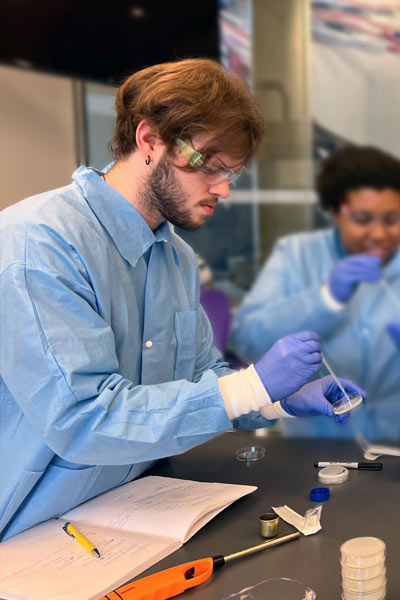
Major: Biochemistry
(Transfered from) Howard Community CollegeTitles:
Saccharomyces cerevisiae as a Model for KRAS G12C Cancers (HCC research)
Nicotine-Induced Associative Learning in Caenorhabditis elegans (Build a Bridge to STEM (BBS) internship research)
[Do] not feel afraid to reach out, gain information, and be willing to put yourself out there.”
Describe your work:
Our project at Howard Community College uses a species of yeast called Saccharomyces cerevisiae to model a type of cancer in humans that occurs from mutations in one of our genes involved with growth, KRAS. Our model could visualize a live cell to see pathways and tumor growth in real-time, which relates our model to live human cells.
Our project at UMBC in the BBS internship uses a roundworm called Caenorhabditis elegans to model human nicotine addiction. We saw if the worm could make an association between their food and the presence of nicotine to see what effect food/hunger has on nicotine addiction.
Who are your mentors for your projects?
At Howard Community College, my mentor is Professor Joseph Sparenberg. I met Professor Sparenberg through the research program at HCC. Our initial talk was riveting, and I found a lot of qualities Professor Sparenberg had as a researcher relatable. His dedication to his research and students despite his very limited time is a quality that I will always respect about him.
At UMBC, my mentor is Dr. Maria Cambraia from the College of Natural and Mathematical Sciences department. I met Dr. Cambraia through the Build a Bridge to STEM (BBS) internship program over the summer. Dr. Cambraia is a selfless and wonderful mentor. Her selfless behavior helped me to establish myself at UMBC and attend the Annual Biomedical Research Conference for Minortized Scientists (ABRCMS).
How did you become interested in these projects?
I had and still have an extremely positive outlook on the success of the project. Professor Sparenberg’s thoughts on the application of our model were very interesting to me, and I knew that his project would be something I would love to dive into. His ideas on how we literally use a live cell to visualize cancer are crazy to me because I knew that traditional research starts within cells that are dead or in a frozen state. Over time, the project has evolved to be a collaborative effort from Professor Sparenberg, myself, and my lab members to determine the future of the project.
At the BBS internship, we were given freedom over our entire project and were allowed to come up with our own research topic, but we had to center it around the C. elegans roundworm. My group, including a current UMBC student, Supriya Jones, were interested in psychology and how people/organisms learn. Our topic on associations between food and nicotine hadn’t been investigated extensively, so we thought it would be quite a novel idea to simulate the learning process in C. elegans.
What has been the hardest part about your research/what was the most unexpected thing about being a researcher?
The hardest part about being a researcher is time commitment. You can only commit so much time to certain tasks and your brain can only take so many rigorous tasks before you either burn out or become tapped out from working for the day. There are definitely ways to circumvent this problem (mainly by finding a balance), but it is quite intimidating at first.
What has been the most rewarding part?
The most rewarding part of my research is the ability to talk about research. From conferences to regular scientific conversations, I have a platform to talk about my research and hear about other’s research. I love feeling involved in a community where I can get to know a diverse collective of research projects to learn a variety of different information.
How will you disseminate your research?
My plan is to present my summer research at the Annual Biomedical Research Conference for Minoritized Scientists (ABRCMS), present my HCC research at URCAD, the Maryland Collegiate STEM Conference, and possibly at the Frontiers at the Chemistry-Biology Interface Symposium conference (FCBIS), and publish my HCC research in the Journal of Research in Progress (JRIP) at HCC or possibly, the UMBC review. Other options for publication or presentation still remain up for discussion.
What is your advice to other students about getting involved in research?
My advice to students trying to get involved in research (especially transfers) is to not feel afraid to reach out, gain information, and be willing to put yourself out there. However, do not overextend yourself and take on a lot of responsibilities in the pursuit of getting yourself established because it is quite possible that you will burn yourself out or lose sense of your priorities.
What are your career goals?
My current career goals are to work toward a Ph.D. in a molecular biology-related field like microbiology, virology, or cancer biology. After obtaining my Ph.D., I plan on doing my post-doc in either public health or academia and working toward becoming a principal investigator in public health or a professor in academia. My end goal is to become involved in administrative work (i.e. a director, a dean, etc.), or possibly pursue scientific entrepreneurship.
Return
10/26/2023